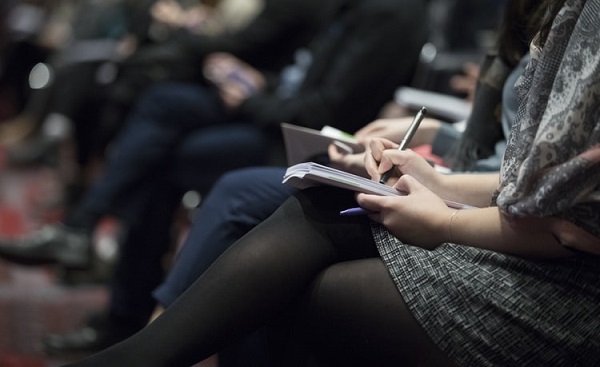Clean Sport at the Front Line 2020: Educating Athlete Support Personnel on protecting clean sport
UK Anti-Doping’s (UKAD) Clean Sport at the Front Line (CS@FL) forum took place on Thursday 12 March, at the Edgbaston Hotel and Conference Centre in Birmingham. The event was well attended with representatives from many sports, across a variety of backgrounds - nutrition, coaching, academics, doctors and physios just to name a few!
There was one thing everyone at the event had in common - a passion for protecting clean sport. This year’s event focused on evidence-based practice and how best to support and protect practitioners, as well as the role of athlete support personnel in protecting athletes.
We learnt a lot over the course of the day, however, here’s the top three things we took away…
Anti-doping education is changing and evolving at a very fast pace
It’s a big year for anti-doping education, and its important athletes and ASP are kept up to date on changes that will affect them. At the event, UKAD’s Code Implementation Manager, Sam Pool, ran attendees through the changes coming to the World Anti-Doping Code in 1 January 2021, and gave ASP advice on how they can prepare in advance for these incoming changes. You can read more on the changes to the Code here.
“UKAD will be providing guidance and support to all those affected by the updated World Anti-Doping Code, to avoid anyone falling foul of the rules. It’s important that everyone involved is engaged in this process, is keeping a close eye on our website and social media channels for updates, and is passionate about adopting these new rules,” says Sam.
Alongside the new Code comes a new International Standard for Education. The expectation is that Signatories of the Code will have modified their anti-doping programmes by the 1 January 2021 to include any changes, ready to support athletes and ASP and communicate the key changes.
UKAD’s Education Programme Manager, Colin Allen said; “We recognise the crucial role that ASP play when supporting athletes, and there will be an emphasis on this group as we adopt the new standard of education. At the event, we gave ASP an insight into the planned changes to education and how they can support these changes, and we explored the role of ASP in-depth, looking at how they can develop a culture of clean sport.”
There’s a lot of research being undertaken in the world of sport and anti-doping
The research universities are undertaking around anti-doping is huge and shows the massive commitment and passion people have in protecting clean sport.
At the forum we heard from several researchers, including Dr. Laurie Patterson from Leeds Beckett University. Laurie held an interactive session with attendees, considering the actions ASP can take to promote clean sport in their environment, by drawing on research, evidence and theoretical frameworks. This was an educational session that made attendees stop and think about their current strategy strengths when it comes to protecting clean sport, and how they could improve going forward.
Following Laurie’s presentation, Jake Shelley (Leeds Beckett University), Andrew Heyes (University of Birmingham) and Hayden Allen (Kingston University) shared their PhD research findings with attendees and the learnings they’ve uncovered from these. Following feedback from athletes interviewed, the students gathered interesting findings on the motivations of doping, the impact doping has on the doper themselves, lessons learnt from clean athletes, the societal issues around taking steroids, and perceptions and impressions of taking asthma medications. A lot of food for thought for attendees to take away!
Later in the afternoon, Dr. Ian Boardley from the University of Birmingham shared a piece of work with attendees, recently carried out by the Research-Embedded Strategic Plan for Anti-Doping Education: Clean Sport Alliance Initiative for Tackling Doping (more commonly known as RESPECT, try saying the full name ten times!). This is a collaborative piece of work underway involving academic and non-academic partners around Europe, to assist with the digital sharing of clean sport research and knowledge regarding doping prevention. Ian also covered the creation of a ten-year research agenda for clean sport education, created with input from anti-doping experts around the globe to help inform future doping prevention efforts.
The rules are there for a reason: to help protect clean athletes
UKAD’s Deputy Director of Legal and Regulatory Affairs, Stacey Cross, gave attendees the run-down on why the Anti-Doping Rules are in place. She focused in on how ASP can help their athletes from inadvertently falling foul of the Anti-Doping Rules, through education on supplement use, updating your Whereabouts, and regularly checking the Prohibited List for example.
With some of the anti-doping rules applying specifically to ASP, Stacey shared some real-life cases with attendees, and provided them with practical tips and guidance on how to avoid these situations, and ultimately, help an athlete avoid a ban from sport.
She also emphasised the importance of reporting doping in sport, sharing that 42% of anti-doping rule violations since April 2017 were intelligence-led!
It was a great day of discussion and debate, and there were many learnings for ASP to take away and apply in their roles. Check out this re-cap video from the event below.


